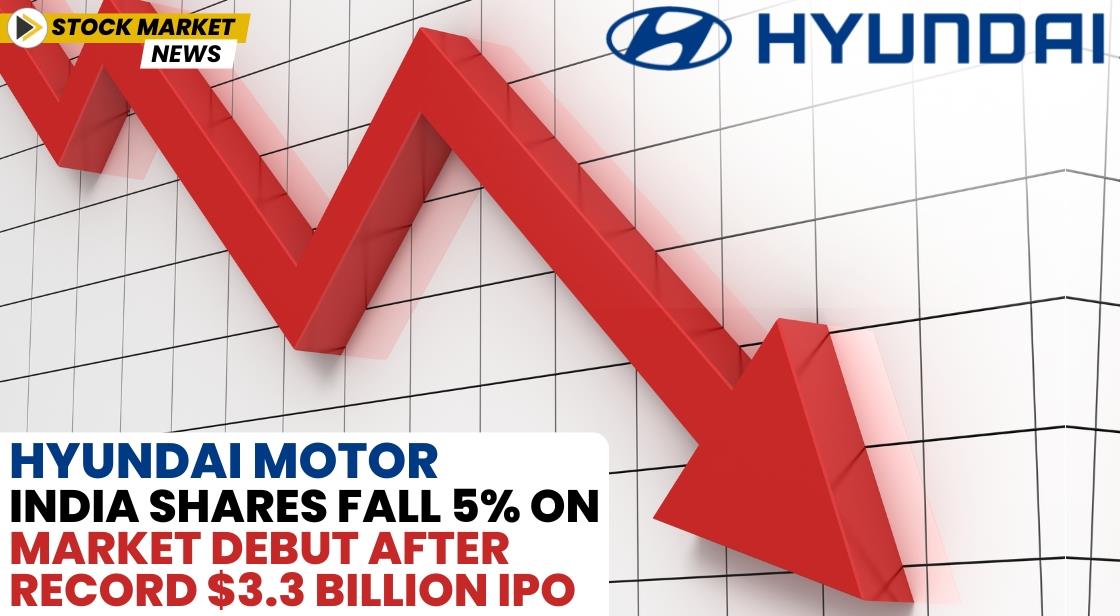Hyundai Motor India Shares Fall 5% on Market Debut After Record $3.3 Billion IPO

News Synopsis
Hyundai Motor India's highly anticipated stock market debut on Tuesday saw a disappointing 5% drop in its share price. This was primarily attributed to concerns over the initial pricing of the IPO, which deterred retail investors. While the offering was oversubscribed by institutional investors, the lack of enthusiasm from retail investors weighed heavily on the stock's performance.
Why Did Hyundai Shares Fall?
-
High Pricing: The stock's initial poor performance was largely due to its high pricing. Many investors felt that the IPO was overpriced, leading to limited short-term gains.
-
Limited Retail Interest: Despite the overall oversubscription, the lack of interest from retail investors was a significant factor in the stock's decline. This was likely due to concerns about the pricing and potential short-term volatility.
Comparison with Previous Indian IPOs
Hyundai's IPO followed two other major Indian IPOs, LIC and One97 Communications, both of which also faced struggles post-listing. This highlights the challenges that large-scale IPOs can face in the Indian market.
Hyundai IPO Valuation Concerns
While Hyundai's valuation is significant, it is still dwarfed by that of its rival Maruti Suzuki. Analysts have raised concerns about the narrow valuation gap between the two companies, particularly when considering their price-to-earnings ratios.
Brokerage Recommendations and Long-Term Outlook
Despite the shaky debut, several major brokerages remain optimistic about Hyundai's long-term potential. They cite the company's strong focus on SUVs and its competitive position in the Indian market as key factors supporting their bullish outlook.
Challenges Ahead
The broader auto market is currently facing challenges due to a slowdown in car sales and rising inflation. This could impact Hyundai's performance in the short term, although its strong SUV portfolio and institutional investor support may provide some resilience.
Conclusion:
Hyundai Motor India's stock market debut, following a record $3.3 billion IPO, has certainly made headlines, but not for the reasons the company might have hoped. The 5% drop in share value on its first day of trading reflects concerns among retail investors over the pricing of the IPO, which many considered too high given the broader market conditions. While institutional investors drove demand during the offering, the lukewarm reception from individual investors hints at a disconnect between the company's expectations and market realities.
This underwhelming start is not unique in the context of India’s largest IPOs. Historical data shows that many of the country’s top listings, including those of giants like Life Insurance Corporation (LIC) and Paytm, also struggled post-debut, listing at significant discounts. Hyundai’s experience echoes these precedents, highlighting the challenges that large-cap companies face in aligning their valuations with investor expectations in a volatile market environment.
However, despite the initial stumble, Hyundai’s long-term outlook remains promising. Analysts from top brokerage firms, including Nomura and Macquarie, have shown confidence in the company’s strategic focus on SUVs, a segment that continues to gain traction in the Indian auto market. Hyundai’s strong SUV portfolio, which contributed to 67% of its sales in Q2 2024, is seen as a key differentiator that could help the company recover and grow in the coming months. These SUVs cater to the rising demand for more spacious and feature-rich vehicles, particularly among urban consumers who are driving much of India’s automotive growth.
Yet, Hyundai's journey will not be without challenges. The Indian auto industry is currently facing a slowdown, with overall car sales cooling off after two consecutive years of record highs. Factors like persistent inflation and macroeconomic uncertainties are causing consumers to delay big-ticket purchases such as cars. This slowdown, coupled with Hyundai’s stiff IPO pricing, has added to the market’s cautious stance.
In comparison to its biggest rival, Maruti Suzuki, Hyundai’s valuation based on the price-to-earnings (P/E) ratio appears to be relatively high, which has fueled concerns about the company’s ability to justify its price in the long term. Maruti’s dominance and larger market capitalization give it a competitive advantage, but Hyundai’s niche in the SUV segment could help narrow the gap over time.
The broader question for Hyundai, and indeed for investors, is whether the company's current challenges are short-term hiccups or indicative of deeper market trends. As India’s auto sector contends with economic headwinds and evolving consumer behavior, Hyundai will need to adapt and innovate to sustain growth. Its SUV strategy appears to be a step in the right direction, but continued success will depend on maintaining its edge in product offerings, managing costs, and effectively navigating the complexities of the Indian market.
For now, Hyundai's stock performance may be a reflection of immediate concerns, but the long-term prospects could still prove favorable. The company’s ability to capitalize on its SUV leadership and strengthen its market position will ultimately determine whether it can turn its current valuation into sustained shareholder returns. As global investors continue to watch India’s equity markets, Hyundai’s performance in the months ahead will offer important insights into the future of the automotive sector and the IPO landscape in the country.
You May Like









